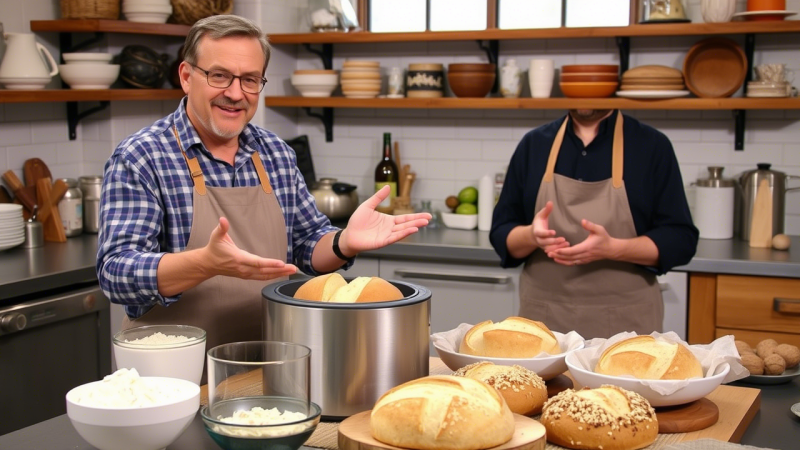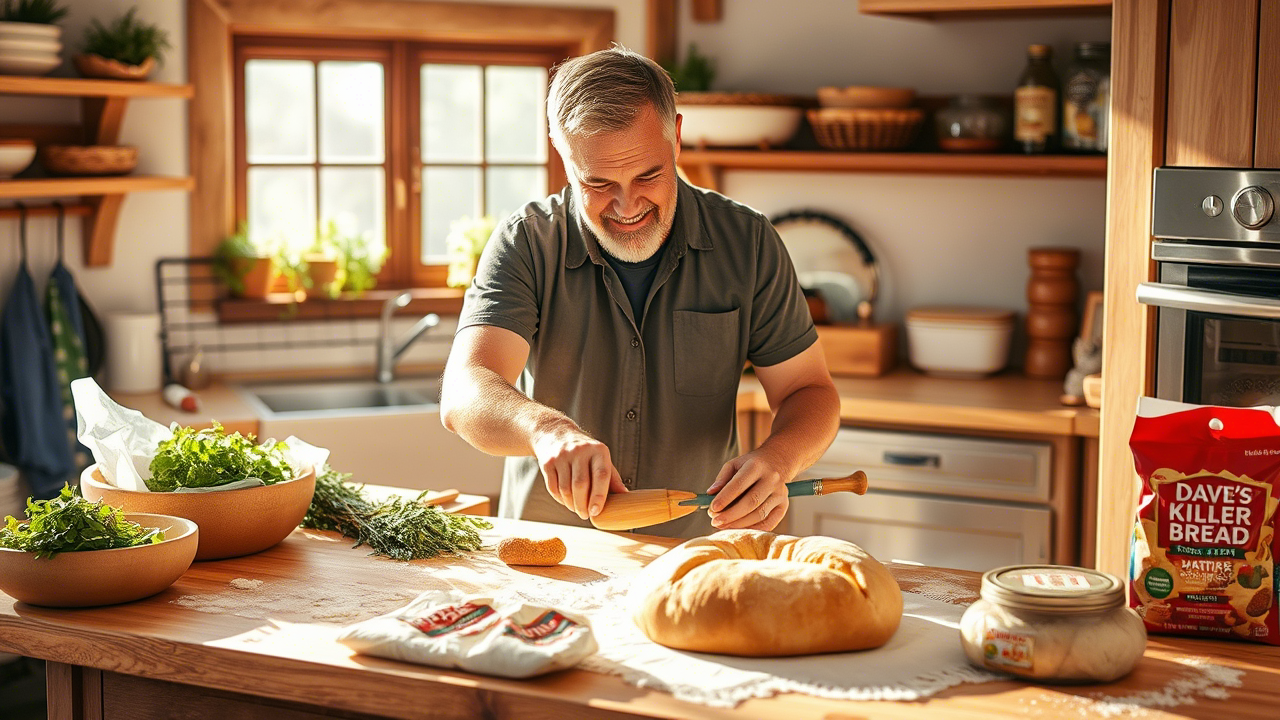Freshly baked bread is more than food — it’s a moment of comfort, creativity, and connection.
Baking bread at home has an unmatched sense of satisfaction: the warm crust crackling as it cools, the pillowy crumb ready to receive a pat of butter, and the rich, yeasty aroma filling every corner of your kitchen. Even if you feel intimidated by traditional bread baking, a bread maker can transform the process into a joyful, approachable adventure.
Dave’s Killer Bread — known for its commitment to organic, whole-grain, and powerfully nutritious ingredients — brings its inspiring ethos to your kitchen through bread machine recipes that are ideal for beginners yet satisfying for experienced bakers. This advanced guide will walk you through the best Dave’s Killer Bread Maker recipes, techniques, troubleshooting, and creative inspiration to turn you into a confident bread maker at home.
Whether you’re crafting a simple white loaf or exploring hearty multigrain marvels, this article is your ultimate roadmap to success.
Essential Tools and Ingredients

Must-Have Tools
- Bread maker with programmable settings
- Measuring cups and spoons (preferably stainless steel)
- Digital kitchen scale for precision
- High-quality bread knife
- Cooling rack
- Food thermometer (to check internal bread temp)
Pro Tip: Always place your bread maker on a stable, heat-resistant surface, away from direct sunlight or stovetop heat.
Key Ingredients
- High-quality bread flour or whole wheat flour
- Filtered water (avoids chlorine taste)
- Active dry yeast or instant yeast
- Sea salt or kosher salt
- Sweeteners like honey, molasses, or organic sugar
- Optional: seeds (flax, chia, sunflower), nuts, dried fruits
Freshness is non-negotiable — stale flour or expired yeast will sabotage even the best recipe.
Beginner-Friendly Dave’s Killer Bread Maker Recipes

Let’s break down a selection of fail-proof recipes you can make with confidence:
1. Classic White Sandwich Bread
Ingredients (1.5 lb loaf):
- 3 ¼ cups bread flour
- 1 ¼ cups warm water (110°F)
- 1 ½ tsp salt
- 1 tbsp sugar
- 2 tbsp olive oil
- 2 tsp instant yeast
Instructions:
- Add water, oil, and sugar to the bread maker pan.
- Add flour and salt.
- Make a small well in the flour, then add yeast.
- Select Basic White cycle, medium crust, 1.5 lb loaf size.
- Press start and let the bread maker work its magic.
2. Multigrain Power Loaf
A hearty, fiber-rich loaf inspired by Dave’s Killer Bread philosophy.
Ingredients:
- 2 cups bread flour
- 1 cup whole wheat flour
- ½ cup rolled oats
- ¼ cup sunflower seeds
- ¼ cup flaxseeds
- 2 tbsp molasses
- 1 ¼ cups warm water
- 2 tsp instant yeast
- 1 ½ tsp salt
Instructions:
- Add liquids first (water + molasses).
- Add dry ingredients except yeast.
- Add yeast on top.
- Use the Whole Wheat or Multigrain program.
- After first knead, sprinkle extra seeds on top for garnish if desired.
3. Banana Walnut Sweet Bread
Perfect for breakfast or a cozy snack.
Ingredients:
- 2 large ripe bananas (mashed)
- 2 ½ cups all-purpose flour
- ½ cup chopped walnuts
- ½ cup sugar
- 2 eggs
- ½ cup butter, melted
- 1 tsp baking soda
- 1 tsp vanilla extract
- ½ tsp salt
Instructions:
- Combine mashed bananas, eggs, vanilla, and melted butter.
- Pour into bread maker pan.
- Add dry ingredients next.
- Choose Cake/Bake mode on your bread maker.
- Bake until a skewer comes out clean.
Advanced Baking Tips and Techniques

✅ Hydration:
Use about 60–65% hydration (water weight relative to flour weight) for soft sandwich bread; increase to 70% for rustic loaves.
✅ Kneading Check (Windowpane Test):
Remove a small piece of dough, stretch gently — it should form a thin “window” without tearing, showing good gluten development.
✅ Autolyse:
Rest flour + water 20 minutes before adding yeast/salt. This improves flavor and texture.
✅ Fermentation Control:
Temperature affects fermentation:
- Ideal dough temp: 75–80°F
- Too cold = sluggish rise
- Too warm = overproofing risk
✅ Yeast Management:
Always store yeast airtight, away from heat, and replace every 4–6 months for consistent results.
Bread Troubleshooting Guide
| Problem | Cause | Solution | Prevention |
|---|---|---|---|
| Dense loaf | Expired yeast | Check dates, use fresh yeast | Store yeast properly |
| Collapsed loaf | Too much yeast or water | Reduce yeast; measure precisely | Use digital scale |
| Gummy crumb | Underbaked | Extend bake time | Use thermometer (195–200°F) |
| Overly hard crust | Machine too hot | Use lighter crust setting | Relocate bread maker away from stove |
| Uneven rise | Bad ingredient layering | Add yeast last, on top of flour | Follow machine instructions carefully |
Exploring Creative Bread Variations

When you feel confident, try these twists:
- Herb Focaccia: Add ¼ cup olive oil + chopped rosemary + sea salt after first rise.
- Seeded Rye: Swap half the flour for rye, add caraway seeds.
- Cheddar Jalapeño Bread: Fold in ½ cup shredded cheddar + 2 tbsp chopped pickled jalapeños at second kneading.
- Spelt Honey Bread: Use 100% spelt flour with honey for a nutty, slightly sweet loaf.
Bread making is a canvas — paint it with your creativity.
FAQs
What is a bread maker, and how does it work?
A bread maker automates mixing, kneading, proofing, and baking, making fresh bread nearly hands-free.
What are the best beginner bread maker recipes?
Simple white sandwich bread, multigrain, and sweet banana bread are perfect for learning.
Can I use gluten-free flour?
Yes, but use a gluten-free bread setting and consider adding xanthan gum to improve structure.
Why does my bread collapse?
Usually from too much yeast or over-proofing; measure accurately and check yeast freshness.
How do I store homemade bread?
Wrap cooled bread in beeswax wrap or store in a bread box for up to 4 days. Freeze if you need longer storage.
Conclusion
Dave’s Killer Bread Maker recipes offer a powerful way for beginners to master home bread making while exploring whole-grain, nutritious, and flavorful bakes. With the guidance above — from precise measurements to creative ingredient experiments — you’ll be well on your way to baking loaves worthy of applause.
Pro baker’s challenge: Try one new flavor combination each week and track your results in a bread journal. You’ll surprise yourself with how quickly your skills grow.

